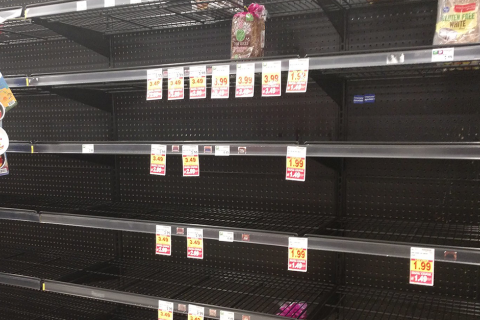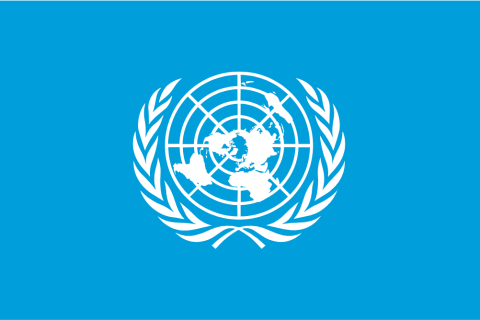
Policy Briefs
UN DESA experts are working to help decision makers around the world navigate tough choices and to find ways to recover better from the COVID-19 crisis and prepare for complex and compounded risks in today's interconnected world.
Watch this space for the latest research, analysis and policy advice from UN DESA, an effort to support and complement the United Nations Secretary-General’s initiatives in response to the COVID-19 crisis, Decade of Action to deliver the Sustainable Development Goals and call by the Member States to advance Our Common Agenda.
UN/DESA Policy Brief #60: Commodity exporters face mounting economic challenges as pandemic spreads
Unlike most developed economies, commodity exporters—saddled with large budget deficits and high levels of government debt—will find it extremely difficult to roll out large fiscal stimulus.
UN/DESA Policy Brief #59: Corona crisis causes turmoil in financial markets
Financial sector measures should complement other national and international actions to address the health, social and economic impact of the crisis.
UN/DESA Policy Brief #58: COVID-19: Addressing the social crisis through fiscal stimulus plans
Countries are quickly acting to counter its negative impact on employment and poverty, including through fiscal stimulus plans. Whether these plans will protect the most disadvantaged people and households over the long-term depends on their size, duration and on how measures are implemented.
UN/DESA Policy Brief #57: Navigating Financial Risks Through Macroprudential Policies: Recent Experiences of Emerging Economies
A decade has passed since the initial onset of the global financial crisis. Following a protracted period of sub-par growth, the global economy has strengthened as the effects of cyclical headwinds and crisis-related legacies dissipate.
UN/DESA Policy Brief #56: The institutional history of WESS—70 years of development policy
The WESS has been the earliest and continuous post-World War II development-focused report, predating any other world development report that appeared thereafter. It was born as a response to the resolution 118 (II) of 31 October 1947.
UN/DESA Policy Brief #55: The Global context for the 2030 Agenda
Globalization and technological progress have enabled unprecedented gains in wellbeing across the world. However, imbalances in global flows, when they emerge, continue to plague the global economic and financial system, and cause development setbacks. The turbulence of the last decade demonstrated once again that global mechanisms remain ill-suited to protect the most vulnerable countries and populations groups from the effects of crises.
UN/DESA Policy Brief #54: Global development trends at the turn of the century
From the mid-1990s to the late 2000s, there are three major issues that shaped the world economy: the convergence of developing countries’ income with respect to the average income of developed economies; the growing unbalances in the global economy which led eventually to the global financial crisis; and the adoption and implementation of the Millennium Development Goals.
UN/DESA Policy Brief #53: Reflection on development policy in the 1970s and 1980s
After almost three decades of remarkable progress since the end of the Second World War, economic conditions started to deteriorate in the 1970s. Economic growth slowed down in all parts of the world during the second half of the 1970s and the first half of the 1980s. Before the oil price shock of 1973, the annual growth of world gross product had been at 5.3 per cent, while during the rest of the 1970s, annual world growth reached only 2.8 per cent.
UN/DESA Policy Brief #52: The Marshall Plan, IMF and First UN Development Decade in the Golden Age of Capitalism: lessons for our time
The Golden Age of Capitalism spanned from the end of the Second World War in 1945 to the early 1970s, when the Bretton Woods monetary system collapsed. It was a period of economic prosperity with the achievement of high and sustained levels of economic and productivity growth. During the Golden Age, the themes taken up by World Economic and Social Survey, henceforth referred to as the Survey, varied from year to year, in response to pressing development concerns.
UN/DESA Policy Brief #51: Reflecting on the World Economic and Social Survey's 70 years of development policy analysis
In drawing the most relevant lessons for implementing the 2030 Agenda for Sustainable Development, the World Economic and Social Survey 2017 systematically reviews the seven decades of development discussions contained in the publication – the oldest continuous publication of its kind.
UN/DESA Policy Brief #50: International finance to support climate change resilience
In the past 20 years, weather-related disasters affected 4.2 billion people worldwide, with a large loss of life and livelihoods. The global annual average cost of climatic disasters, including floods, storms, droughts and heat waves, is estimated to have risen from $64 billion during the period 1985-1994 to $154 billion in the period 2005-2014. A more complete estimate of global costs, taking into account the loss associated with slow-onset climate events (e.g., sea-level rise and desertification), is likely to yield a larger figure.
UN/DESA Policy Brief #49: Data and statistics for climate change resilience
Identifying the population groups at greatest risk due to climate-related events, understanding the specific risks they incur, and monitoring the interventions to reduce their vulnerability requires basic indicators on populations in vulnerable zones. Furthermore, these indicators must meet international criteria for standardized sources and methods, frequency and continuity, and be easy to understand.
UN/DESA Policy Brief #48: Adaptation to climate change requires transformative policies
Climate change has a differential impact on people and communities. The people at greatest risk are the poor, the vulnerable and the marginalized that, in most cases, have been excluded from socioeconomic progress. Differences in wealth; unequal opportunities to access quality health services, education and employment; and inequality with respect to voice and political representation are the underpinnings of continued exposure and vulnerability of large population groups to climate hazards. Public policies have an important role to play in strengthening the capacity of people to adapt, particularly in those areas where the private sector is unlikely to invest.
UN/DESA Policy Brief #47: Benefits of engaging stakeholders in integrated climate impact assessments
At the core of the 2030 Agenda for Sustainable Development is the intention to build consistency across the various dimensions of development. Implementation of a holistic agenda such as this will increase the demand for integrated assessment approaches as the basis to improve policy coherence. The international community of natural and social scientists has adopted these approaches, particularly for assessing scenarios of potential impacts of climate hazards on people and their livelihoods.
UN/DESA Policy Brief #46: Integrating methodologies to support the assessment of options for climate change resilience
The intensity and frequency of climate hazards have increased with climate change, imposing large costs on societies. Building resilience to withstand climate hazards requires improved understanding of possible impacts from climate change and the policy options that, by preventing loss of lives and livelihoods in the face of such impacts, improve development prospects. However, bringing the science of climate change to development policy is not simple; in fact, integrating the many facets of environmental concerns into development policies is a major challenge in the implementation of the 2030 Agenda for Sustainable Development. Based on the experience of the past decades, policymakers have gained better understanding of the links between the economic and social dimensions of development.
UN/DESA Policy Brief #45: The nexus between climate change and inequalities
Climate change and inequality are two of the most important challenges currently faced by the international community. An extensive review of the evidence in the World Economic and Social Survey 2016: climate change resilience, an opportunity for reducing inequalities suggests that the impacts of climate change and structural inequalities are locked in a vicious cycle. Large inequalities in access to physical and financial assets; unequal access to quality health services, education and employment; and inequality with respect to voice and political representation aggravate the exposure and vulnerability of large population groups to climate hazards. Better understanding of the links between climate change impacts and inequalities will help to improve the design and implementation of policies able to simultaneously address climate change hazards and socioeconomic inequalities.
UN/DESA Policy Brief #44: Building climate change resilience for sustainable development
Climate change is already imposing a significant burden on all countries, extreme in some cases. Several small-island developing States are facing the realistic risk of becoming completely submerged under water due to sea-level rise. Severe drought and shortage of water are endangering livelihoods around the world and, the warming of surface temperatures and changing weather patterns and threatening human lives. Warming has contributed to the change in vegetation and distribution of fish species at the global level, and to the spread of vector-borne diseases to wider areas. People living in coastal zones are facing greater risks of floods and storm surges and people living in mountainous areas are becoming more exposed to the risk of landslides and soil erosion. No one is immune to climate change, but the economic cost and the magnitude in which it affects human lives and livelihoods vary among countries, among communities within countries and even among people within communities.
 Welcome to the United Nations
Welcome to the United Nations



